 |
| |
News | Events | Commentaries | Publications
|
News
|
 |
SIPRI statement on the 2025 Nobel Peace Prize
SIPRI congratulates María Corina Machado on the award of the 2025 Nobel Peace Prize, ‘for her tireless work promoting democratic rights for the people of Venezuela and for her struggle to achieve a just and peaceful transition from dictatorship to democracy’. ‘In awarding the 2025 Nobel Peace Prize to María Corina Machado, the Norwegian Nobel Committee highlights her courage and commitment in defending democracy in Venezuela and unifying opposition to the ruling regime,’ said SIPRI Director Karim Haggag.
Read more
|
|
 |
New SIPRI data on women in multilateral peace operations
This year marks 25 years since United Nations Security Council Resolution 1325 on women, peace and security. To coincide with this milestone, SIPRI has released an overview of women’s representation in multilateral peace operations that presents data on aggregate personnel trends, annual snapshots of data on women’s representation in leadership, and annual averages of women in the personnel of peace operations and in member state contributions. It looks at UN peace operations, European Union Common Security and Defence Policy missions and operations, and Organization for Security and Co-operation in Europe field operations. The objective is to support the efforts of multilateral organizations and their member states to increase the representation of women in multilateral peace operations.
Read more
|
|
 |
SIPRI presents new report on youth, climate, peace and security
This month SIPRI announced a new report capturing takeaways from a 2025 Stockholm Forum session co-organized with the Folke Bernadotte Academy (FBA), the UN Development Programme (UNDP), and the Kofi Annan Foundation. The report distils recommendations to scale up youth-led initiatives at the climate–peace–security nexus. It highlights intergenerational dialogue and concrete actions for stakeholders.
Read more | Read the report
|
|
|
Recent events
|
Taking the Pulse of the Western Balkans
16 October 2025
SIPRI hosted a panel discussion on the political developments and security dynamics in the Western Balkans, featuring experts from Bosnia and Herzegovina, Kosovo and Serbia. The event provided an opportunity to interact with journalists and civil society representatives from across the region, who visited SIPRI as part of a project funded by the Swedish Institute.
Read more
|
|
Governing the Peace and Security Risks of AI Agent Interactions
15 October 2025
This public webinar expanded on a new SIPRI Essay on artificial intelligence (AI) agents. AI agents, when deployed and interacting at scale, may behave in ways that are hard to predict and control. Experts from Berkeley’s Risk & Security Lab, the Centre for the Governance of AI, and Google DeepMind discussed unpredictable agent-to-agent behaviours, adversarial vulnerabilities and governance needs.
Read more | Read the SIPRI Essay
|
|
SIPRI hosts expert workshop on space and strategic stability
9–10 October 2025
SIPRI hosted a closed-door expert workshop on ‘Space and Strategic Stability’. The workshop brought together British, Chinese, European and United States experts from legal, technical and military backgrounds to identify shared concerns and explore potential risk-reduction measures involving China and the United Kingdom. Participants examined national space policies and doctrines, recent developments in space technologies, and threat perceptions in the space domain.
Read more
|
|
SIPRI co-hosts events in Jordan on militarization and masculinity
9 October 2025
SIPRI co-hosted two events in Amman, Jordan, on men, militarization and masculinities in the Middle East and North Africa and how gender norms shape peacebuilding across the region. Marking the 25th anniversary of the Women, Peace and Security (WPS) agenda, the programme featured a roundtable on engaging men and boys in WPS efforts and a panel highlighting local experiences from ongoing regional conflicts.
Read more
|
|
Resolving conflicts in an insecure world
7 October 2025
SIPRI’s Governing Board hosted a public conversation about escalating global instability, the breakdown of arms control, and record military spending. Speakers examined how climate pressures, aid declines, and international humanitarian law violations intensify human insecurity and complicate peacemaking. The session stressed safeguarding pathways for peaceful conflict resolution despite great-power rivalry.
Read more | Read more about SIPRI’s Governing Board
|
|
SIPRI gathers global experts in Stockholm for nuclear–AI workshop
22–23 September 2025
SIPRI convened diplomats and experts—including from seven of the nine nuclear-armed states—to test scenarios on how military AI could raise nuclear escalation risks. Discussions aimed to refine risk-reduction measures and will inform a forthcoming SIPRI publication.
Read more
|
|
|
|
|
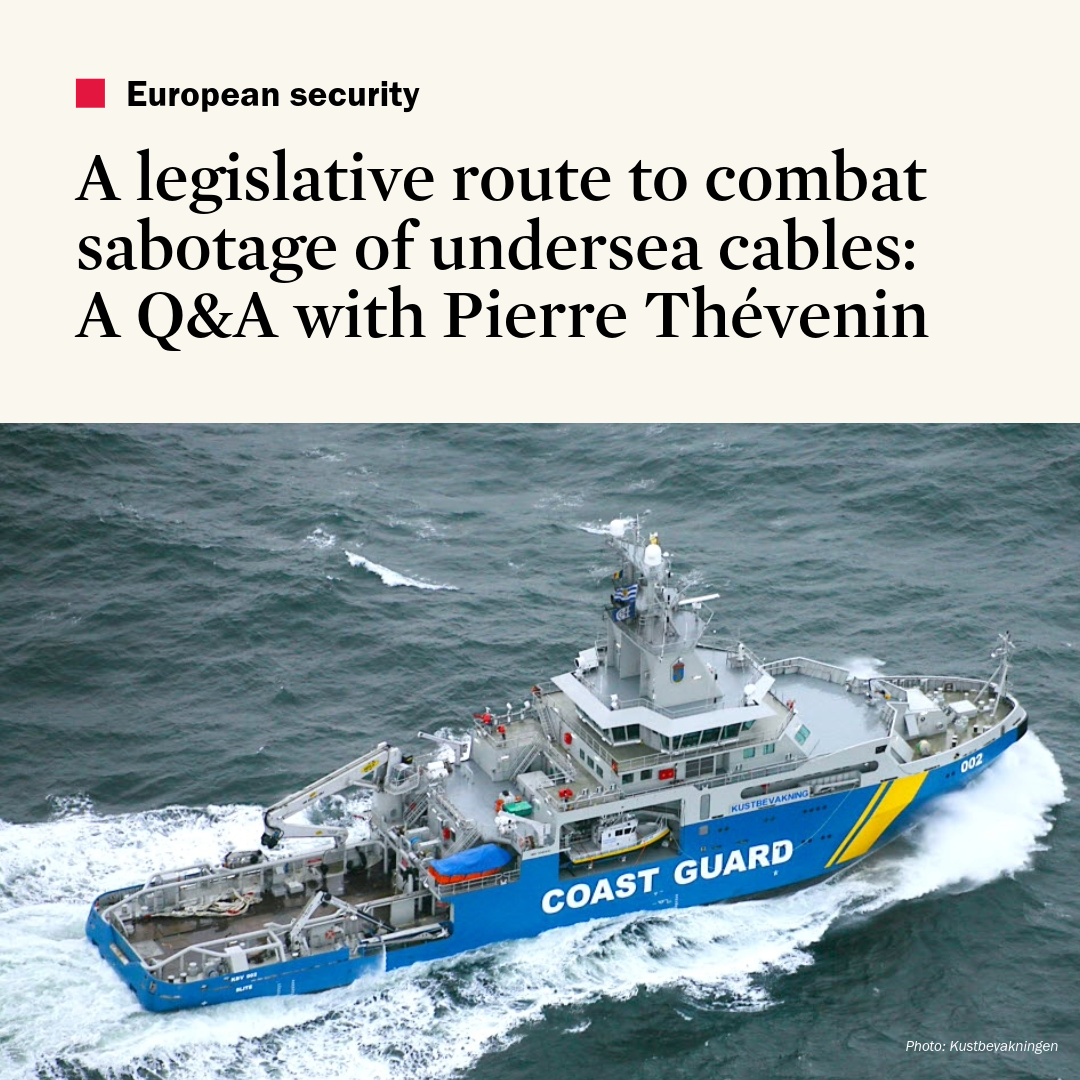 |
A legislative route to combat sabotage of undersea cables: A Q&A with Pierre Thévenin
In this Q&A, law of the sea expert Pierre Thévenin explains why incidents—like suspected anchor-dragging in the Baltic—are hard to prosecute under current UN Convention on the Law of the Sea interpretations. The Q&A explores some of the legal obstacles to investigating and prosecuting vessels suspected of damaging submarine cables and how European states could remove these obstacles with new legislation.
Read the SIPRI Topical Backgrounder
|
|
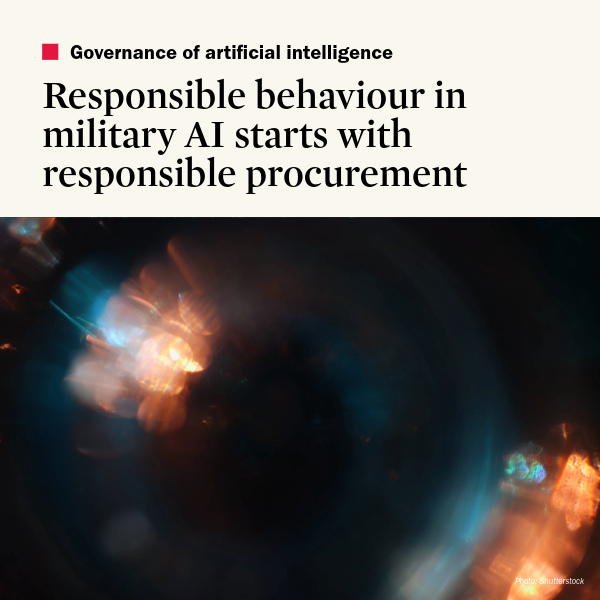 |
Responsible behaviour in military AI starts with responsible procurement
This SIPRI Essay argues that procurement is where ‘responsible AI’ commitments must be operationalized—through legal reviews, rigorous testing and evaluation, data governance and supplier transparency. The piece cautions that streamlining acquisitions to speed up adoption can conflict with safety and accountability, and urges those involved in military procurement to embed responsibility throughout the acquisition lifecycle.
Read the SIPRI Essay
|
|
(1).png) |
How top arms exporters have responded to the war in Gaza: 2025 update
Following the Hamas-led attack on southern Israel on 7 October 2023, during which around 1200 Israelis were killed, Israel launched an intensive military campaign in Gaza. Until a fragile ceasefire agreed earlier this month, Israel’s military campaign had continued, with little interruption, for the past two years. This backgrounder looks at developments over the past year in the policy and practice of six of the world’s top 10 exporters of ‘major conventional arms’ in 2020–24, according to the SIPRI Arms Transfers Database, in relation to the war in Gaza. It also includes the latest available SIPRI data on transfers of major conventional arms to Israel.
Read the SIPRI Topical Backgrounder
|
|
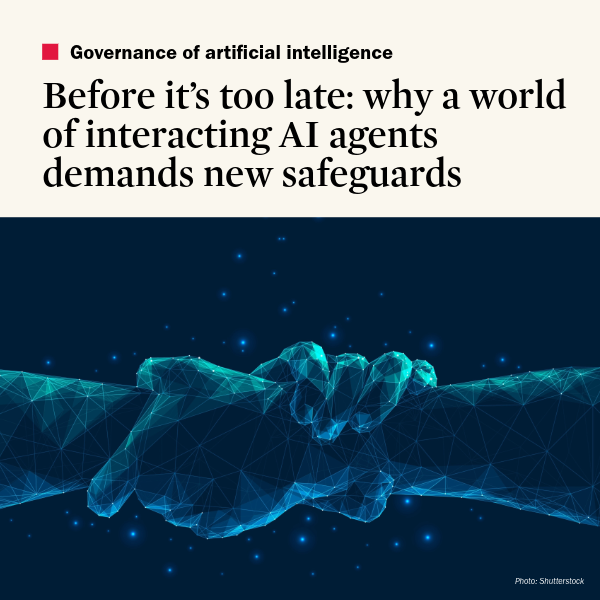 |
Before it’s too late: Why a world of interacting AI agents demands new safeguards
AI agents, when deployed and interacting at scale, may behave in ways that are hard to predict and control. This has implications for AI governance as well as for international peace and security. The international policy community needs to recognize and respond to the risks that emerge from interacting AI agents in short order. This essay discusses some of the risks associated with interacting AI agents and suggests international governance responses.
Read the SIPRI Essay
|
|
 |
SIPRI experts were recently featured in these external outlets:
|
|
|
Publications
|
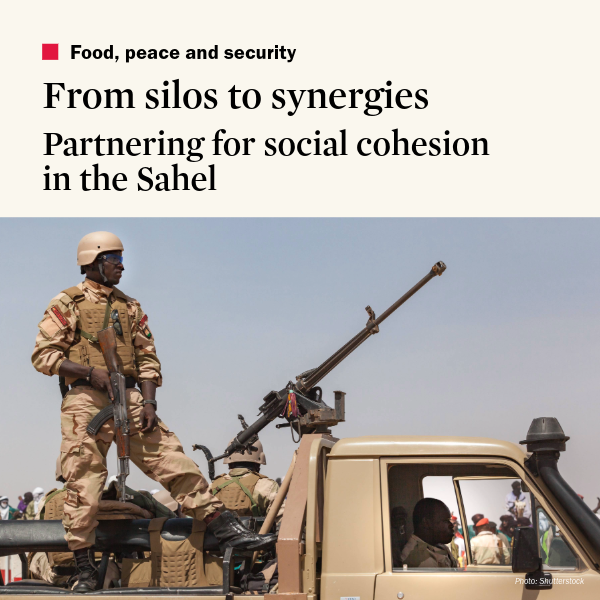 |
From Silos to Synergies: Partnering for Social Cohesion in the Sahel
This paper examines the Sahel Resilience Partnership (SRP)—an initiative that seeks to operationalize the humanitarian–development–peace nexus across the Sahel. The SRP responds to instability through coordinated, multisectoral programming that links food and nutrition security, climate-resilient ecosystems, social services and conflict resolution. The paper highlights the SRP’s strengths, including its multilevel governance structure and emphasis on community engagement and learning. It also discusses key operational challenges, such as navigating political transitions and coordinating across organizations with different mandates. The paper concludes with practical recommendations for donors and implementing partners.
Read the SIPRI Research Policy Paper
|
|
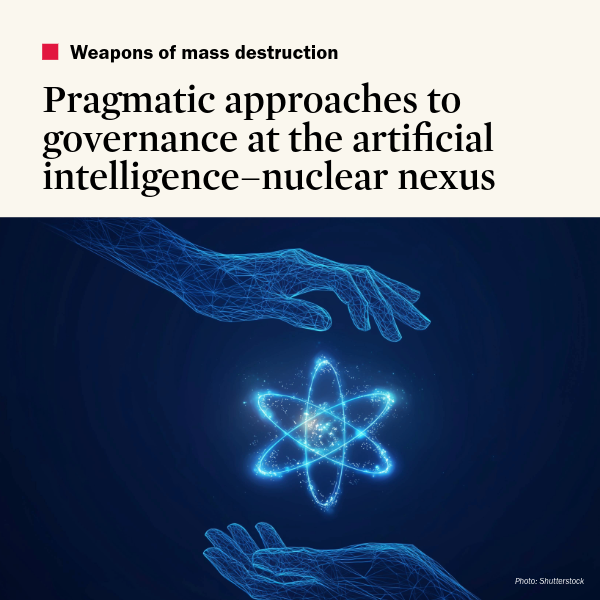 |
Pragmatic Approaches to Governance at the Artificial Intelligence–Nuclear Nexus
The integration of AI into nuclear and nuclear-related weapon systems is reshaping global security and influencing strategic stability. Although AI enhances speed, precision and data processing, it also introduces uncertainty that could weaken deterrence and increase the risk of escalation and inadvertent nuclear use. This report seeks to advance the discussion by identifying commonalities in risk assessments on the AI–nuclear nexus, examining the current debate and approaches on human control and offering practical recommendations for moving forward.
Read the report
|
|
.png) |
Climate-resilient Investment in Fragile and Conflict-affected Situations: Opportunities for Business?
Climate change exacerbates risk in fragile and conflict-affected situations, deepening vulnerabilities, disrupting livelihoods and heightening the risk of violent conflict. These dynamics create a vicious circle that undermines resilience, peace and stability, while also affecting business operations and global supply chains. This research policy paper highlights the role of businesses—from local small to medium-sized enterprises to multinationals—in investing in resilience-building initiatives and innovations that strengthen local economies, reduce conflict drivers and open new markets.
Read the SIPRI Research Policy Paper
|
|
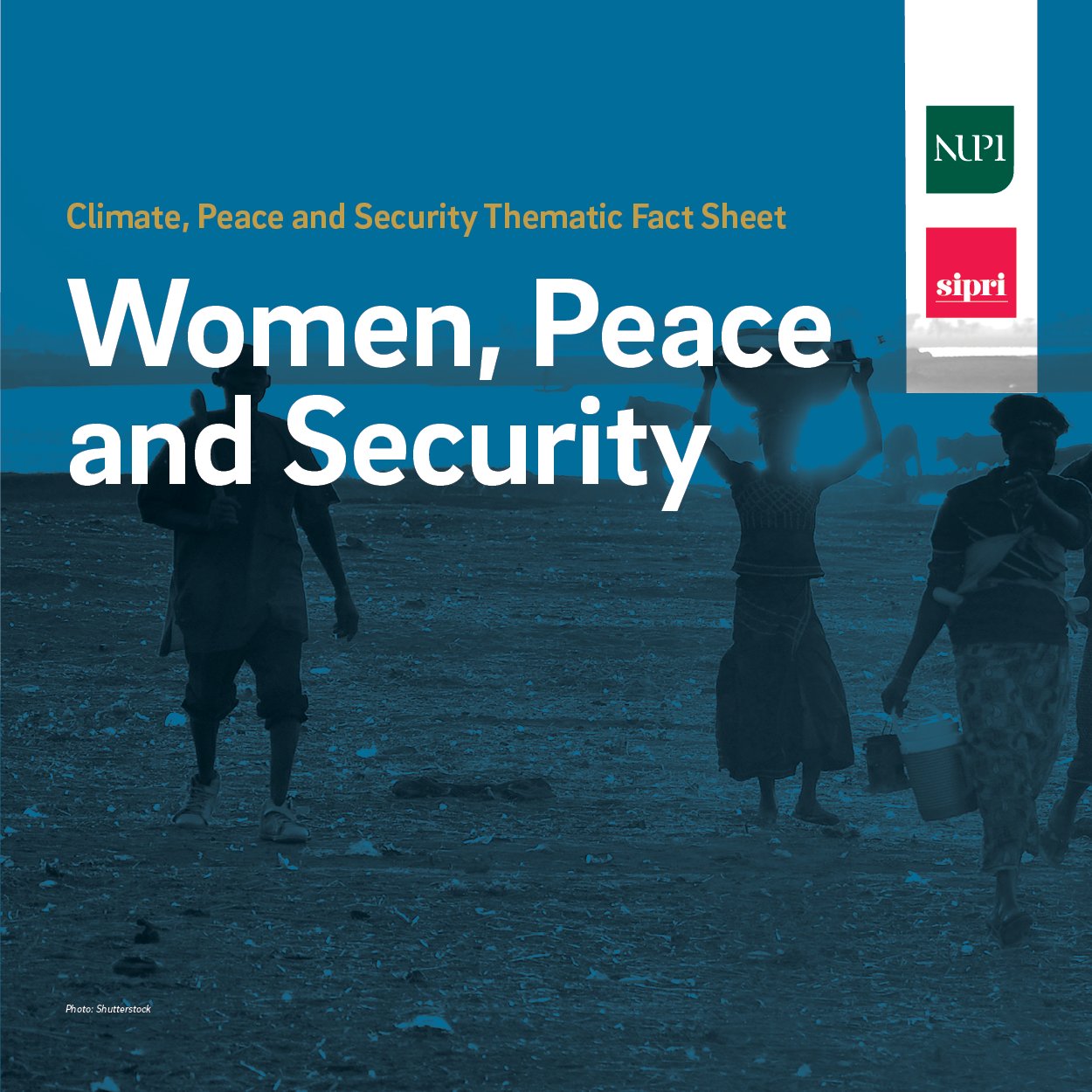 |
Climate, Peace and Security Thematic Fact Sheet: Women, Peace and Security
This Climate, Peace and Security Thematic Fact Sheet examines how women, peace and security concerns intersect with climate-related risks and conflict dynamics. It highlights the ways in which gender inequalities shape vulnerability, resilience and participation in peacebuilding, and offers recommended actions for the international community to integrate gender-responsive approaches into addressing these challenges.
Read the Fact Sheet
|
|
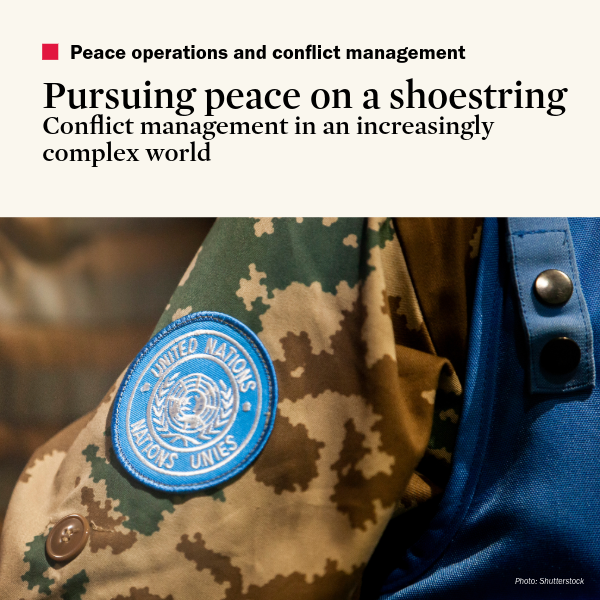 |
Pursuing Peace on a Shoestring: Conflict Management in an Increasingly Complex World
Multilateral conflict management is in a state of flux. In the face of enormous challenges, the world is more divided than it has been for a long time. Fragmentation, deinstitutionalization and militarization, combined with the erosion of many values-based norms, threaten the very survival of the multilateral system. This SIPRI Research Policy Paper maps existing debates about the future of global conflict management, combining expert insights with a review of the broader literature. It aims to set the stage for a forthcoming series of regional meetings on the same topic.
Read the SIPRI Research Policy Paper
|
|
 |
A Decade of Youth, Peace and Security: Fostering Intergenerational Action on Climate, Peace and Security
This report compiles key takeaways from a session at the 2025 Stockholm Forum on Peace and Development, organized by SIPRI, FBA, the UNDP and the Kofi Annan Foundation. The session convened young leaders and decision makers in an intergenerational dialogue on climate, peace and security.
Read the report
|
|
|
|
|
|
|
|
Accurate, dependable information is more important than ever. Invest in the facts.
Support SIPRI
|
|
 |
| SIPRI is an independent international institute dedicated to research into conflict, armaments, arms control and disarmament. Established in 1966, SIPRI provides data, analysis and recommendations, based on open sources, to policymakers, researchers, media and the interested public. |
|
|